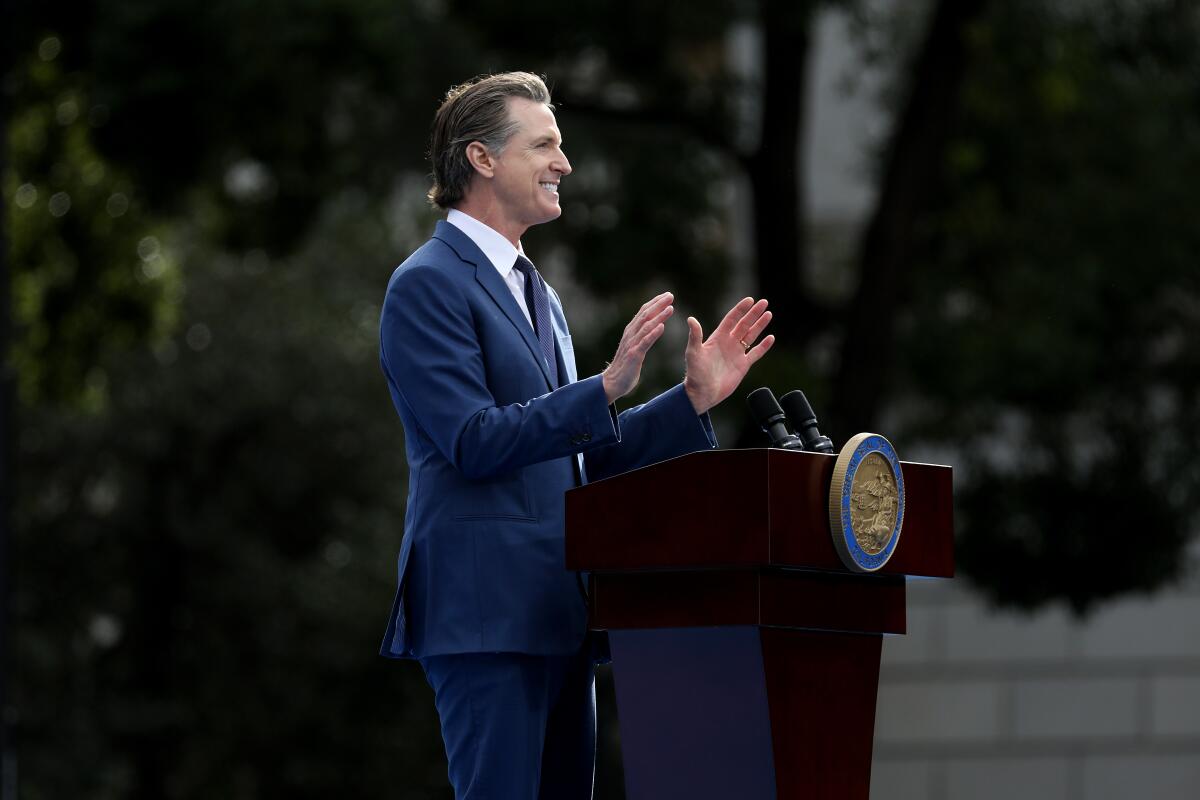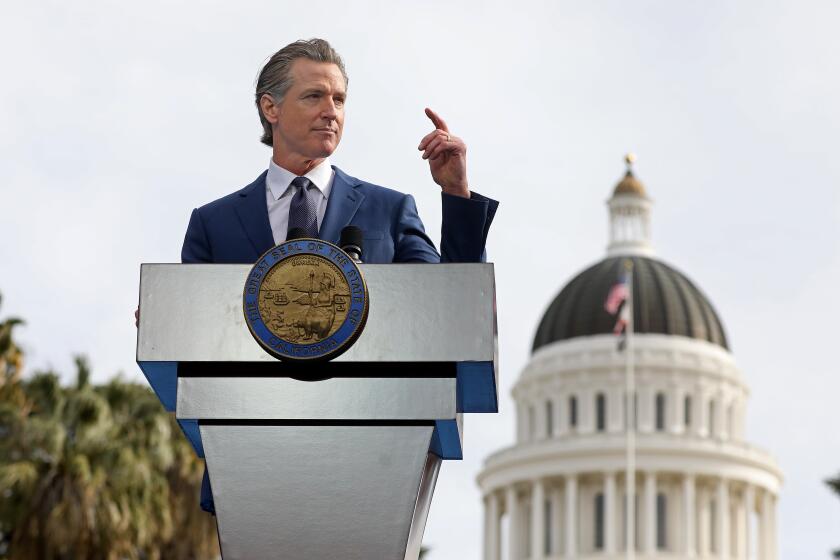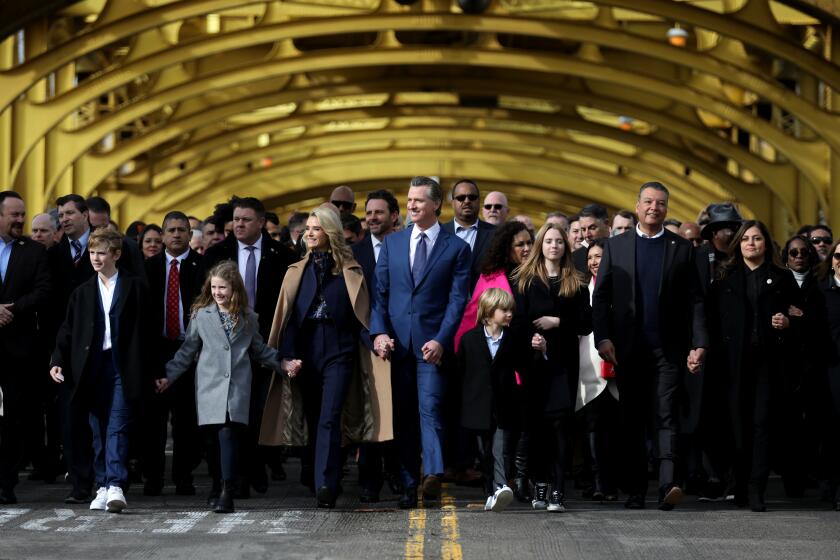Newsom is the luckiest California governor ever. But is his good fortune running out?

SACRAMENTO — Gov. Gavin Newsom is arguably the luckiest California governor ever. But some of that luck will run out with the Republican takeover of the U.S. House.
Newsom was immensely lucky that fellow Democrats controlled the federal government the last two years. President Biden and Congress showered California with tens of billions in economic aid, enough for the governor to avoid a budget crisis this winter.
It’s doubtful the federal largess would have showed up if Biden had lost to then-President Trump in 2020 and if Democrats hadn’t controlled the Senate and House by razor-thin margins.
“If it was up to, respectfully, the Republican Party, none of this would have happened. Not one dollar would have come our way,” Newsom told reporters Tuesday, referring to federal funding boosts as he unveiled a $297-billion state budget plan for the next fiscal year.
In all, Newsom said, California has received $48 billion from two major federal bills: the $700-billion Inflation Reduction Act and the $1.2-trillion Infrastructure Investment and Jobs Act. Much of the money was distributed to local governments and private entities.
“We could receive an additional $48 billion,” he said.
That’s luck. But Newsom has been lucky for several reasons since taking office four years ago.
Both legislative houses have been controlled by supermajorities of Democrats. He can govern without Republican interference. He doesn’t need them for anything.
Newsom has had no significant political rival in either party. Republicans are too weak. Democrats don’t dare.
Thanks to voters in 2010, the legislative vote requirement for passing a budget is only a simple majority. Before that, a two-thirds vote was needed, resulting in summer-long deadlocks that tarnished the images of all Sacramento politicians. These days, it’s easy for a governor to get his spending plan passed.
Gov. Gavin Newsom plans to deal with a projected $22.5-billion state budget deficit by reducing investments in climate change programs.
Newsom also was lucky to govern in good economic times. Until very recently, the state treasury continually overflowed with tax revenue. Unlike predecessors Jerry Brown and Arnold Schwarzenegger, Newsom hasn’t had to gut popular state programs to balance the books, angering political allies.
Last year, a ridiculous $100-billion surplus was projected for the current budget. But because of the economic downturn, general fund tax revenues are running nearly $30 billion short, resulting in a projected deficit of $22.5 billion.
Except for brief fiscal jitters during the 2020 pandemic that turned out to be a false scare, this is the first time Newsom has confronted a real deficit.
The governor was justified in patting himself on the back and praising the Legislature for socking away nearly $36 billion in various piggy banks — so-called rainy-day funds — to be tapped during bad times. But he left them alone. Things could get worse, he explained, and they’d be needed then.
“We’re not touching the reserves because we have a wait-and-see approach to this budget,” he said.
Gov. Gavin Newsom held his inauguration to launch his second term as California governor on Jan. 6, contrasting the state’s values with those of the insurrectionists who stormed the U.S. Capitol two years ago.
Newsom was able to preserve the state savings accounts largely because of federal generosity, he told reporters.
In particular, it allowed him to cut climate programs and transportation funding. The federal Inflation Reduction Act contained $375 billion for climate programs.
Newsom and the Legislature had allocated $54 billion over a five-year period for climate fighting — such as providing more charging stations for electric vehicles — but he trimmed that to $48 billion.
The governor called for delaying lots of planned programs for a year, but not outright eliminating them. He proposed paying for some public works projects with bond financing rather than cash. He reduced some planned expenditures but offered a “trigger” mechanism that would restore the funding if tax revenues picked up.
No slash and burn. Just a gentle touch as you’d expect from a liberal governor. But even with that, he’ll be under pressure from liberal lawmakers and interest groups to restore the cuts when he revises the budget proposal in May.
Newsom was asked by a reporter whether he thought the House leadership change would affect the state budget. His immediate answer seemed to contradict what he’d said a few minutes earlier about how Republicans wouldn’t have produced federal funding as Democrats did.
“Speed bumps,” Newsom replied. “I don’t see their agenda getting any traction whatsoever.”
He said House GOP legislation would be blocked by Senate Democrats and Biden.
House Speaker Kevin McCarthy’s “priorities … are not the agenda of the American people,” Newsom said. “It’s just noise.”
But then he seemed to think again and added, “They can be a roadblock. … Momentum will be disrupted.
“So, we have to step up our game. … We have the moral authority to push back, and I can assure you we will do that.”
And his relationship with fellow California native McCarthy? “To be determined.”
Regardless of how far their legislation advances in Congress, however, House Republicans are positioned to block additional funding for California. They’ve never been enthusiastic about climate programs, for example.
And one thing seems certain: There won’t be any additional federal funding for California’s practically broke bullet train while McCarthy is speaker. He’s one of the pokey project’s most adamant opponents.
Rare bad luck for Newsom.
More to Read
Sign up for Essential California
The most important California stories and recommendations in your inbox every morning.
You may occasionally receive promotional content from the Los Angeles Times.













